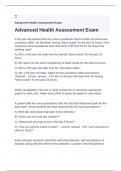AD
AD
Advanced Health Assessment Exam
Advanced Health Assessment Exam
A 59 year old patients tells the nurse practitioner that he thinks he must have
ulcerative colitis. He has been having "black stools" for the last 24 hours. How
would the nurse practitioner best document THE FACTS for his reason for
seeking care?
A) JM is a 59 year old male here for having "black stools" for the past 24
hours.
B) JM came into the clinic complaining of black stools for the past 24 hours.
C) JM is a 59 year old male here for "ulcerative colitis."
D) JM, a 59 year old male, states he has ulcerative colitis and wants it
checked. - correct answer ✔A) JM is a 59 year old male here for having
"black stools" for the past 24 hours.
Chief Complaint(s) The one or more symptoms or concerns causing the
patient to seek care. Make every effort to quote the patient's own words.
A patient tells the nurse practitioner that she has had abdominal pain for the
past week. What would be the best response by the nurse practitioner?
A) We'll talk more about that later in the interview."
B) "Have you ever had any children?"
C) "What have you had to eat in the last 4 hours?"
D) "Can you point to where it hurts?" - correct answer ✔D) "Can you point to
where it hurts?"
Each principle symptom should be well-characterized, with descriptions of
location; along with the other seven attributes. Location: Ask the patient to
,point to the pain because lay terms may not be specific enough to localize the
site of origin.
A 29-year-old woman tells the nurse that she has "excruciating pain" in her
back. Which of the following would be an appropriate response by the nurse
to her statement?
A) "How does your family react to your pain?"
B) "That must be terrible. You probably pinched a nerve."
C) "I've had back pain myself and it can be excruciating."
D) "How would you say the pain affects your ability to do your daily activities?"
- correct answer ✔D) "How would you say the pain affects your ability to do
your daily activities?"
Inquire about the effects of pain on the patient's daily activities, mood, sleep,
work, and sexual activity.
In recording the childhood illnesses of a patient who denies having had any,
which of the following notes by the nurse would be most accurate?
A) Patient denies usual childhood illnesses.
B) Patient states he was a "very healthy" child.
C) Patient states sister had measles, but he didn't.
D) Patient denies measles, mumps, rubella, chickenpox, pertussis, rheumatic
fever, and polio. - correct answer ✔D) Patient denies measles, mumps,
rubella, chickenpox, pertussis, rheumatic fever, and polio.
Childhood illnesses include measles, rubella, mumps, whooping cough,
rheumatic fever, scarlet fever, and polio. They are included in the past history.
A patient tells the nurse that he is allergic to penicillin. What would be the
nurse's best response to this information?
,A) "Are you allergic to any other drugs?"
B) "How often have you received penicillin?"
C) "I'll write your allergy on your chart so you won't receive any."
D) "Please describe what happens to you when you take penicillin." - correct
answer ✔D) "Please describe what happens to you when you take penicillin."
Allergies, including specific reactions to each medication, such as rash or
nausea, must be recorded.
The nurse is taking a family history. Important diseases or problems to ask the
patient about include:
A) emphysema.
B) head trauma.
C) mental illness.
D) fractured bones. - correct answer ✔C) mental illness.
Specifically ask for any family history of heart disease, high blood pressure,
stroke, diabetes, obesity, blood disorders, ovarian cancer, colon cancer, sickle
cell anemia, arthritis, allergies, alcohol or drug addiction, mental illness,
suicide, seizure disorder, kidney disease, and tuberculosis. The other answers
are acquired.
The following information is recorded in the health history: "Patient denies
chest pain, palpitations, orthopnea, and paroxysmal nocturnal dyspnea."
Which category does it belong to?
A) Chief complaint
B) Present illness
C) Personal and social history
D) Review of systems - correct answer ✔D) Review of systems
, Most review of systems questions pertain to systems. You may also draw on
Review of Systems questions related to the Chief Complaint to establish
positives and negatives that help clarify the diagnosis.
Which of the following statements represents subjective data obtained from
the patient regarding his skin?
A) Skin appears dry.
B) No obvious lesions
C) Denies color change
D) Lesion noted lateral aspect right arm - correct answer ✔C) Denies color
change
Remember that the history (from the chief complaint through review of
systems) should be limited to patient statements or subjective data—factors
that the person says were or were not present.
Subjective data is what the patient tells you.
The following information is best placed in which category? "The patient had a
stent placed in the left anterior descending artery (LAD) in 1999."
A) Medical
B) Surgical
C) Obstetrics/gynecology
D) Psychiatric - correct answer ✔B) Surgical
Provide information relative to Adult Illnesses in each of four areas: Medical,
Surgical, Obstetric/Gynecologic, and Psychiatric.




